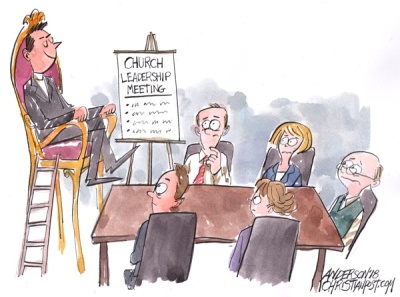6 danger signs for Christian leaders
There is much handwringing and anguish over the recent stories of high-profile moral failures of Christian leaders. We are hurt, confused and angry that our leaders have failed to demonstrate faithfulness to the very principles they are teaching. The enemy leaps on this and uses these failures to weaken the faith of those who are impacted. We can and should be a light to the world instead of succumbing to the pressures and patterns of this dark world (Romans 12:2).

In my almost 3 decades of ministry, I have seen and counseled a large number of these fallen Christian leaders. This is more than I have ever wanted to. These leaders are people who God loves and forgives. They are not the enemy but have fallen into the snares set for them by the one who would see the goodness of God distorted. This enemy is not overly creative in his attacks on the faith, and the patterns used are discernable. I have seen six common threads in the failures of those I have counseled over the years. Each of these threads are deadly in isolation and gain even more strength in combination. Often, they build on one another and when in full bloom, some level of moral failure is almost certain.
1) Leaders begin to believe the vision they are pursuing is their own, not God’s.
One of the powerful things that Christian leaders have is vision. This vision can be for building up a church or ministry, gathering people, encouraging people, or bringing about healing and many other things. The key thing is that this vision is unique and inviting. It draws people to support and implement it. This vision is key to a leader’s success in the endeavors they are called to.
The problem arises when the leader begins to appropriate the vision as their own, losing sight of the fact that the vision is from God, for God, and serves God’s purposes. In the challenge of ministry to broken people (yes, that is who we all are), the pursuit of this vision requires significant effort on the part of the leader. The leader can fall into the trap of thinking the vision came from within themselves rather than from God. This is a key step away from the humility required for true Christian leadership. Pride sets in and begins to eat away at the faith of the leader.
2) Leaders begin to believe that they have natural talents instead of having gifts from God.
Second to vision, the ability to communicate that vision and inspire people to follow it is key to a leader’s ability to implement a vision. God gifts individuals with the ability to do this for His purposes, whether that gift is given at birth or is clearly given at some later point. When a leader begins to think that the talent comes from within themselves rather than an external, humbly received gift from God, the opening for deadly pride has again been accessed.
3) Leaders begin to believe that success is a result of their own efforts, not blessings from God
Ministry is hard work. I know this from my own experience as a Christian leader and from counseling many in ministry. This hard work requires thought and action on the part of the leader. It requires a dedication of personal resources that can be overwhelming at times and success is easily seen as a result of this hard work instead of the showering of blessing by God. At times, success in God’s eyes looks very different from success in worldly eyes and the leader can be tempted to abandon God’s vision and replace it with their own vision and work. When a leader begins to think they alone are responsible for the success of the ministry, hearing God communicate His perceptions of success becomes impossible and that ugly pride again gains access.
4) Leaders begin to believe that they are controllers of people, not facilitators of growth.
As I noted in the first danger sign, the people we lead are broken (even as we are). As the sin nature of those we lead becomes apparent, we can come to believe that the people we have been given to lead (think Moses and the Exodus) are stiff-necked, reluctant and in need of stern discipline. When this belief sets in the leader is tempted to resort to manipulation and intimidation instead of a transparent and inviting leadership. This destroys the leader’s ability to love those who are placed in their care and God’s vision is lost.
5) Leaders begin to believe they are alone, not part of the Body.
When we have lost sight of our unique place in the Body of Christ, especially as leaders, it is common to begin to feel alone and isolated. There is no one to turn to for help and there is no one to confide with about our deep struggles. If we also have come to believe that we are responsible for manipulating people into compliance with our vision, this becomes even more severe. This isolation is known to be a major part of the pattern of moral failure.
6) Leaders begin to believe that their actions are invisible or undetectable to people and that God either does not care or will forgive.
Finally, when a leader has reached the point that they believe that anything they do is not disqualifying in God’s eyes and can be and will be freely forgiven, it is a short step to act in secrecy and do things that are known to be harmful to the leader’s spiritual health. When the position of power is such that the leader believes that what they do can be hidden and remain hidden, there are few limits that cannot be breached.
All these danger signs can be more subtle than I have presented them as we are incredibly capable of self-deception. Sometimes it takes a significant effort to unearth the true feelings in these areas. All of them are signs of disconnection from God and His Body on earth. The preventative solutions are found in the kind of self-honesty that King David displayed along with the deep humility that comes from acknowledging our imbedded sin nature. A moment-by-moment awareness of our need for a Savior is desperately needed.
Philippians 2:3 (ESV)
Do nothing from selfish ambition or conceit, but in humility count others more significant than yourselves.
Michael Murphy is co-author of Leading Beyond Your Limits. He has served in a variety of leadership roles in ministry settings in both church and mission fields since 1993.




























